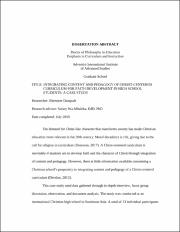| dc.contributor.author | Danquah, Ebenezer | |
| dc.date.accessioned | 2021-07-26T06:00:32Z | |
| dc.date.available | 2021-07-26T06:00:32Z | |
| dc.date.issued | 2019-07 | |
| dc.identifier.uri | https://dspace.aiias.edu/xmlui/handle/20.500.12977/442 | |
| dc.description | Unpublished Dissertation (PhD Education)
Shelf Location: BR115.L32 .D35 2019 ATDC | en_US |
| dc.description.abstract | The demand for Christ-like character that transforms society has made Christian education more relevant in the 20th century. Moral decadence is rife, giving rise to the call for religion in curriculum (Donovan, 2017). A Christ-centered curriculum is inevitable if students are to develop faith and the character of Christ through integration of content and pedagogy. However, there is little information available concerning a Christian school’s propensity to integrating content and pedagogy of a Christ-centered curriculum (Dernlan, 2013).
This case study used data gathered through in-depth interview, focus group discussion, observation, and document analysis. The study was conducted at an international Christian high school in Southeast Asia. A total of 13 individual participants
and 2 groups participated in this study. The data analysis was done through identifying patterns and themes, noting of links and differences to the forming of concepts explaining the case study. The findings indicated that a curriculum based on makes it Christ-centered. Students could develop personal faith when there is a connection between teacher and students and students to students because of the bond of friendship. The findings further stressed the use of holistic integration and blending themes of the lesson being taught and themes about Christ for the faith development of high school students. Using a pedagogical approach of cooperative learning that encourages interaction among students was touted as an effective way to make high school students develop faith. The study revealed that teachers must have the requisite Christ-centered curriculum training so that they can help high school students develop faith.
The study showed that when school administrators mentor, model, and undertake instructional supervision, it helps teachers to improve in integrating content and pedagogy of a Christ-centered curriculum. The practical implications of the findings of the study revealed that Christ should be the reference point in teaching any lesson in the classroom. The study concludes with the presentation of a model that describes the process teachers must go through to be able to integrate content and pedagogy of Christ-centered curriculum. | en_US |
| dc.language.iso | en_US | en_US |
| dc.publisher | Adventist International Institute of Advanced Studies | en_US |
| dc.subject | Christian education -- Philosophy. | en_US |
| dc.subject | Learning and scholarship -- Religious aspects -- Christianity. | en_US |
| dc.subject | Faith. | en_US |
| dc.subject | Education, Secondary. | en_US |
| dc.title | Integrating content and pedagogy of Christ-centered curriculum for faith development in High school students : a case study | en_US |
| dc.type | Dissertation | en_US |

